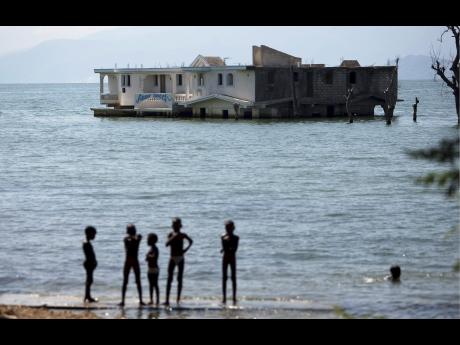David Jessop | The media and the linguistic divide
In the middle of last month, Danilo Medina was sworn in as president of the Dominican Republic for a second term.
His inauguration was attended by many senior figures from the Americas, including the prime minister of Antigua, Gaston Browne, who, earlier the same month, quite separately, had met with him and his then foreign minister.
Some days later, the Dominican Republic's new foreign minister, Miguel Vargas, said in one of his first public statements that he believed his country needed to exert greater influence on regional and international organisations.
Mr Vargas then went on to meet on August 30 in Port-au-Prince, Haiti's interim president, Jocelerme Privert, and others. There, they agreed to revive the two nations' Joint Bilateral Commission to try to resolve issues relating to cross-border trade, investment, and migration.
I note this not to point out the emptiness of Caricom's continuing position of ostracising a country that now has the most dynamic economy in the Caribbean, but to highlight the absence of detailed reporting on these and many other issues that cross the Caribbean's linguistic divide.
It is a failing that should be a matter of concern in the region to all who wish to see the Caribbean better integrated at an economic level and able eventually to then promote globally its unique multicultural identity.
To be clear, this is not only a criticism of shortcomings in the print and broadcast media that serve Caricom's 5.5 million English speakers, but is directed equally at other parts of the region.
In the Dominican Republic, despite having a hugely sophisticated, diverse, and extensive national media, it fails to describe, let alone try to explain, what is happening in the Anglophone Caribbean.
NEED FOR CONTINUITY
Much the same holds true in the media in the French Caribbean's DÈpartement D'outre-mer (the DOM) in which it is easier to discover what is happening in Paris than in Anglophone neighbours; and in Cuba, too, where regional news is usually only addressed at the time of a visit or when it is politically relevant. Only in the Dutch-speaking islands or Suriname is there some coverage, perhaps reflecting long-standing employment, family, and trading ties.
By this, I don't mean knowledge of the high-profile headline developments that the international news agencies invariably report, but the continuity and detail of what is happening across the region in politics, economics, trade, and popular culture that might enable all to become more aware and better able to form fact-based opinions.
There are, of course, web publications in the Hispanic, francophone and Dutch Caribbean that carry national news in English. These include the excellent daily domestic reporting of Dominican Today and DR1, and that of other online national news publications like Haiti Libre and the CuraÁao Chronicle.
There are also many online Cuban publications carrying national news in multiple languages other than Spanish. Unfortunately, nothing similar is produced in the Anglophone Caribbean that provides news on a daily basis in Spanish or French, or it appears, much interest in incorporating a wider spectrum of regular news from across the linguistic divide in any national media outlet based within the region.
The reason for this failure to offer genuine region-wide daily coverage seems to reflect to a significant extent a structural fault stemming from colonial geographic and cultural divisions and the consequent prejudices and preoccupations that continue to this day.
JOURNALISM UNDER-RESOURCED
Just as significantly, the absence of news from across the divide also reflects more generally the under-resourcing of journalism in the region and the absence of experienced or trained stringers or correspondents paid to feed news stories to the more significant media outlets in the region.
This matters because it means that many of those who determine external policy or business relationships have little awareness of what is happening in countries sometimes vastly larger or even adjacent that speak a different language, and secondly because it undermines Caribbean integration.
Objective media flows across the language divide should be regarded as just as important as finding practical solutions as to the problems of air and sea transport, non-tariff barriers, visa regimes, the xenophobia of immigration services, and all the other issues that continue to hamper inter-regional trade.
International relations are in flux, the world's leading nations are moving again towards defined geostrategic blocs, spheres of influence are returning, as a completely new type of cold war is taking shape in which boundaries and sovereignty become traduced or suborned by ambiguity, cyber penetration, and investments sometimes larger than the economies of the countries concerned.
It is a background against which a more open-minded Caribbean-wide discussion is required about inter-regional relationships, whether newer configurations might make the region more economically coherent, and being prepared to accept that the larger economies of the region, including the Dominican Republic, Cuba, and the French DOM, can play an important future role in stimulating growth.
Unfortunately, in much of Caricom, what is lacking is a willingness to ask whether a closer relationship with one or another non-traditional regional partner might in the medium term bring benefit.
While there are initiatives such as that by France and the French Caribbean with Caricom and with the nations of the OECS, a now strong bi-lateral trade relationship between the Dominican Republic and Trinidad, and there is a deep and emotional relationship between almost every country in the Caribbean and Cuba, what is required is the willingness to ask, as is now happening in Jamaica, whether there are additional paths beyond Caricom to economic integration and growth.
Central to this is for those in a new generation, whether in government, the private sector, or academia, to be prepared to think differently about their location and how new initiatives might be informed, developed, sustainably funded, and delivered.
One small but important starting point should be a better information flow across the linguistic divide.
- David Jessop is a consultant to the Caribbean Council. Email: david.jessop@caribbean-council.org

